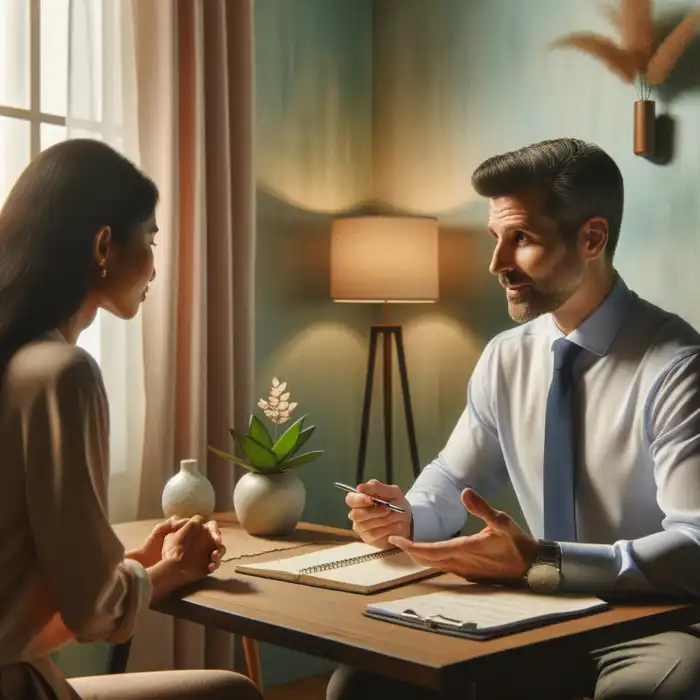Communication Strategies for Coaches

Posted on: 2025-03-21
By: Elara Morgan
Have you ever wondered why some teams excel while others struggle, despite having similar talent? The answer often lies in effective communication. For coaches, mastering this skill isn't just beneficial—it's essential for fostering growth and success within a team.
What You Will Learn
- Effective communication builds trust and enhances team cohesion.
- Clear, concise instructions are vital for improved athlete performance.
- Engaging athletes in strategic discussions fosters critical thinking and autonomy.
- Motivational coaching hinges on the ability to communicate effectively.
- Constructive feedback improves skill development and athlete engagement.
- Active listening techniques can significantly enhance communication effectiveness.
- Conflict resolution strategies can strengthen team dynamics and camaraderie.
- Incorporating interactive elements can make communication training more engaging and effective.
Key Components of Effective Communication Strategies for Coaches
Understanding the impact of effective communication on athlete development and coaching success.
Communication Skills
- Active Listening
- Boosts trust and understanding
- Enhances engagement
Feedback Strategies
- Constructive Feedback
- Improves skill development
- Encourages dialogue
Conflict Resolution
- Open Dialogue
- Builds trust and camaraderie
- Strengthens team dynamics
Understanding the Importance of Effective Communication in Coaching
Effective communication is crucial for successful coaching. It goes beyond just giving instructions; it's about fostering trust and creating an environment where athletes feel comfortable expressing themselves. According to the International Coaching Federation (ICF), communication is a core competency that underpins the entire coaching process. As a coach, I’ve seen firsthand how good communication can lead to improved performance, greater team cohesion, and enhanced athlete satisfaction.
When athletes and coaches communicate effectively, it creates a stronger bond. This bond helps athletes develop not only their physical skills but also their mental toughness. They learn to trust their coach and work towards shared goals, making them more open to feedback and improvement.
The Role of Communication in Athlete Development
Communication plays a vital role in athlete development. It helps coaches convey expectations, set goals, and guide athletes through their training journey. By using clear and concise language, coaches can ensure that athletes understand what is required of them, enhancing their chances of success.
Furthermore, effective communication can help athletes develop their own decision-making skills. When coaches engage them in conversations about strategy and tactics, athletes become more adept at thinking critically and adjusting their performance. They learn not just to follow directions but also to understand the 'why' behind each instruction.
- Clear instructions boost performance.
- Open dialogue fosters trust.
- Critical thinking enhances decision-making.
Why Coaches Should Focus on Communication Skills
Coaches should prioritize communication skills because they are fundamental to creating a positive training environment. When coaches communicate effectively, they can motivate their athletes and help them overcome challenges. The American Psychological Association notes that coaching psychology plays a key role in building mental resilience and driving performance. This motivation can be the difference between a good athlete and a great one!
Additionally, focusing on communication skills can lead to better feedback loops. When athletes feel heard and understood, they are more likely to respond positively to critiques. As a coach, I’ve found that when I ask for their input and listen actively, it makes a world of difference in their engagement and motivation.
- Effective communication boosts motivation.
- Open feedback improves skill development.
- Better communication leads to stronger relationships.
Key Components of Effective Communication Strategies for Coaches
To communicate effectively as a coach, one must understand key components that enhance these interactions. These strategies not only improve understanding but also empower athletes. When I implement these methods in my coaching practice, I notice a significant positive shift in my team's dynamics.
By focusing on aspects such as active listening, asking open-ended questions, and recognizing nonverbal cues, coaches can create a more inclusive atmosphere. This allows for deeper connections with athletes, ultimately leading to better performance and satisfaction.
Pro Tip
Did you know? Implementing regular "communication check-ins" with your athletes can significantly enhance your coaching effectiveness. Use these informal sessions to discuss not just their performance, but also their feelings about communication within the team. This fosters openness and allows for any issues to be addressed before they escalate.
Engaging with Effective Communication Strategies: Tips and FAQs
Effective communication is not just a skill; it's a lifeline in coaching! As a coach, I often encounter questions about how to enhance communication with athletes. This section will address some of those common queries, along with practical strategies that can help improve our interactions.
Common Questions Coaches Have About Communication
Many coaches wonder, "How can I improve my listening skills?" This is crucial because active listening fosters trust and understanding. I always remind myself that listening is just as important, if not more, than speaking when it comes to effective communication.
- Focus on the athlete's words without planning your response while they speak.
- Ask clarifying questions to ensure you understand their points.
- Provide feedback that shows you value their perspective.
Another frequent question is, "What are the best practices for providing feedback?" This is where the balance between critique and encouragement comes in. Giving feedback can be a fine art!
- Be specific about what the athlete did well and what needs improvement.
- Use "I" statements to express feelings and observations, which makes feedback more personal.
- Encourage a two-way conversation to allow athletes to express their thoughts.
How Can I Improve My Listening Skills as a Coach?
Improving listening skills is a game-changer in coaching! Harvard Business Review points out that great listeners do more than just stay silent—they actively engage and respond, which builds trust and understanding. One technique I find helpful is practicing reflective listening. This means repeating back what the athlete has said to show that you understand.
Also, be aware of distractions. In our fast-paced world, it’s easy to lose focus. Setting aside your phone or other distractions during conversations can significantly enhance your listening skills!
What Are the Best Practices for Providing Feedback?
Providing feedback effectively requires thoughtfulness. I always recommend the “sandwich method” where you start with positive feedback, address areas for improvement, and then end with encouragement.
This method ensures athletes feel valued while also understanding what needs work. It creates an environment where they can grow without feeling overwhelmed.
Interactive Elements to Enhance Learning
Engagement is key to learning. I love incorporating interactive elements like quizzes and exercises to assess communication skills and practice techniques. These activities not only make learning fun but also lead to deeper understanding!
Quizzes to Assess Communication Skills Effectively
Quizzes can be a fun way to reflect on communication skills. Here are some ideas to consider:
- Create multiple-choice questions about active listening techniques.
- Include scenarios to assess how one might respond in various communication challenges.
- Encourage athletes to rate their own communication skills in specific situations.
Exercises for Practicing Effective Communication Techniques
Here are a few exercises I like to practice with athletes:
- Role-playing different scenarios to teach active listening and feedback.
- Pairing athletes to share their thoughts and then summarize each other’s points.
- Group discussions on how they feel about communication methods within the team.
Strategies for Conflict Resolution and Management in Coaching
Conflict can arise in any team, but how we handle it matters. As a coach, I’ve learned that having strategies in place can help maintain harmony. Here are some effective techniques I’ve found useful!
Effective Techniques for Managing Disagreements
When disagreements occur, it’s important to address them head-on! Here are some strategies:
- Encourage open dialogue where each party can express their views.
- Facilitate a discussion to find common ground.
- Model respectful communication to set an example.
Improving Team Dynamics Through Conflict Resolution
Resolving conflicts can actually strengthen team dynamics. I’ve noticed that when athletes work through disagreements together, it builds trust and camaraderie. Read more about enhancing your online coaching skills.
By encouraging athletes to communicate openly, they learn to navigate challenges together, which is invaluable on and off the field!
Summarizing Key Takeaways for Effective Coaching Communication
In summary, effective communication is essential in coaching. By focusing on active listening, providing thoughtful feedback, and engaging with athletes, you can create a supportive environment.
Remember, continuously developing these skills will enhance not only your coaching but also the overall experience for your athletes. Let's keep striving to improve our communication!
So, what are you waiting for? Start implementing these strategies in your coaching practices today!
Recap of Key Points
Here is a quick recap of the important points discussed in the article:
- Effective communication fosters trust and creates a comfortable environment for athletes.
- Clear instructions and open dialogue enhance athlete performance and critical thinking.
- Prioritizing communication skills can significantly boost athlete motivation and engagement.
- Active listening and asking open-ended questions are essential for effective coaching interactions.
- Providing constructive feedback using methods like the “sandwich method” encourages growth and understanding.
- Conflict resolution strategies are crucial for maintaining team dynamics and fostering camaraderie.
FAQs about Effective Communication in Coaching
- What are the key components of effective communication for coaches? Effective communication involves active listening, providing constructive feedback, and engaging in open dialogue with athletes.
- How can coaches improve their listening skills? Coaches can improve their listening skills by practicing reflective listening, minimizing distractions, and asking clarifying questions.
- What is the "sandwich method" for giving feedback? The sandwich method involves starting with positive feedback, addressing areas for improvement, and concluding with encouragement to create a supportive atmosphere.
- How can conflict resolution strategies enhance team dynamics? By encouraging open dialogue and respectful communication, conflict resolution strategies can help build trust and camaraderie among team members.
- Why is engaging athletes in discussions about strategy important? Engaging athletes in strategic discussions fosters critical thinking, autonomy, and better decision-making skills, enhancing their overall performance.
 Every coach faces unique challenges in navigating the online coaching landscape. From maintaining cl
Every coach faces unique challenges in navigating the online coaching landscape. From maintaining cl
 In a world where technology evolves rapidly, the essence of coaching remains anchored in human conne
In a world where technology evolves rapidly, the essence of coaching remains anchored in human conne
 In the competitive world of coaching, having a well-optimized website is not just an option—it's a
In the competitive world of coaching, having a well-optimized website is not just an option—it's a